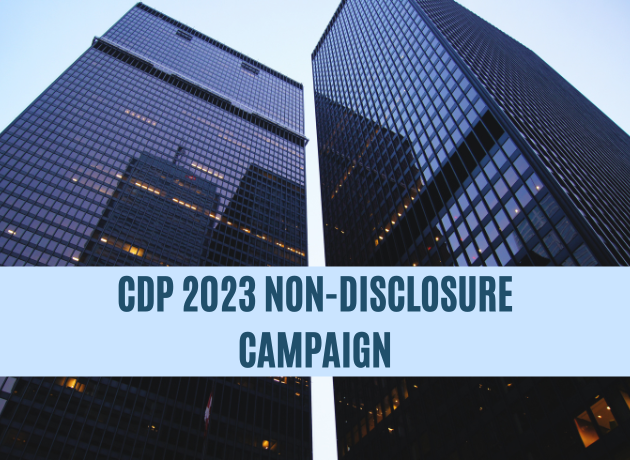
Submitted by isil.oral on June 7, 2023
Over 1600 non-disclosing high-impact companies urged to share environmental data by nearly 300 leading financial institutions
- A record 288 financial institutions with nearly US$29 trillion in assets – Schroders, Cathay Financial Holdings (Cathay FHC), Aviva Investors and Manulife – are directly engaging with 1,607 highest-impact companies not currently disclosing environmental data through CDP
- Saudi Aramco, Exxon Mobil Corporation, Glencore, Chevron, Tesla Inc, Volvo Group, Roche Holding AG, Swatch Group, and Caterpillar among non-disclosing companies, with over US$21 trillion in assets, to be directly targeted in the financial institution-led campaign
- There are 5 companies from Turkey as well that have been requested to disclose within the scope of this campaign.
- The number of financial institutions backing the CDP campaign has more than quadrupled since it launched in 2017, as mandatory disclosure regulation across the UK, EU, Brazil, Japan, and US inches closer
- Demand for disclosure on companies’ impacts on climate change remains high at nearly 72%, while demand for disclosure on forests rises by 3%.
The annual financial institution-led Non-Disclosure Campaign (NDC) launches with an unprecedented 288 global institutions directly engaging 1,607 of the world’s highest-impact companies to demand that they disclose environmental data through CDP, the global environmental disclosure non-profit. The campaign sees financial institutions using their influence and market position to help drive responses from companies that have failed to respond to CDP’s disclosure request.
CDP’s analysis of its 2022 non-disclosure campaign, which drove responses from 388 high environmental impact companies, revealed that companies were overall 2.3 times more likely to disclose if they were directly engaged by financial institutions. This year, Schroders, Cathay FHC, Aviva Investors, Manulife, Sumitomo Life Insurance, AQR, Legal & General Investment Management (LGIM) and PGGM will join financial institutions from across 31 countries, with a staggering total US$29 trillion in assets, to urge non-disclosing companies to respond to CDP’s disclosure request. Since the campaign launched in 2017, financial institutions’ participation has more than quadrupled – showing an average yearly growth of 33%.
The companies targeted in the 2023 campaign include repeat non-disclosers such as Saudi Aramco, Exxon Mobil Corporation, Glencore, Chevron, Tesla Inc, Volvo Group, Roche Holding AG, and Caterpillar. Combined, all 1,607 high-impact companies sprawled across 51 countries, represent a combined +US$21 trillion in global market capitalization (as of February 2023), and emit an estimated +4,200 megatonnes (Mt) of carbon dioxide equivalent (CO2e) annually – almost equivalent to the GHG emissions of the United Kingdom, the European Union and Canada combined.[1],[2]
Companies will be asked to disclose data on at least one of three priority themes of climate change, forests, water, and for the first time a new module of plastics in the water questionnaire – as relevant to their operations – with an aim to drive greater transparency on environmental impacts and investment risk and increase capital market action on sustainability.
Keeping with the trends from previous campaigns, data on climate change-related disclosure remains the most highly sought data by financial institutions – 72% of companies targeted will be asked to disclose on this theme. Despite the higher rate of requests for climate change data, financial institutions are increasingly pushing for disclosure and action on water and deforestation – this year, 28% of the companies targeted will be requested to report on their water-related impact, while 26% will be asked to disclose on forests. With deforestation rates at 10 million hectares per year and 22% of emissions coming from land use, the consistent rise in the number of companies being asked to disclose on forests impact points to both an awareness of the impact of corporate activities on forests and the increasing risks deforestation poses to business operations.
The water-related impact is growing as a priority focus for financial institutions. Biotech and pharmaceuticals, retail as well as oil and gas extraction and production companies, are the industries most targeted for disclosure on water in this year’s campaign. The apparel and textiles industry, due to heavy use and pollution of water throughout the production process, are also key targets for disclosure on this theme.
Incoming mandatory disclosure regulation across the UK, EU, Brazil, Japan, the US, and most other major economies has increased pressure on financial institutions and companies alike if they are to remain agile and competitive in a rapidly evolving market.
For more information about the Non-disclosure campaign, please check here.
For the full version of the news, please check here.





